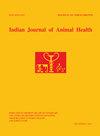山羊呼吸道曼氏菌病的病理形态学和分子研究
IF 0.4
4区 农林科学
Q4 AGRICULTURE, DAIRY & ANIMAL SCIENCE
引用次数: 0
摘要
背景:曼氏菌(Mannheimia)是一种革兰氏阴性、兼性厌氧菌,不形成孢子,不运动,属于巴斯德菌科。山羊细菌性肺炎最常见的病原菌是溶血曼氏菌(以前称作溶血巴氏杆菌)和多杀性巴氏杆菌,这两种病原菌更经常与急性肺炎爆发和山羊死亡有关,尤其是幼羊。曼氏菌是一种机会性病原体,主要栖息于山羊和绵羊的鼻咽部和扁桃体。本研究旨在对阿萨姆邦古瓦哈提的曼氏菌病进行研究,以诊断和控制山羊的这种疾病。研究方法本调查于 2021-2022 年期间在阿萨姆邦古瓦哈提进行。从附近的屠宰场以及在古瓦哈提-22 卡纳帕拉 A.A.U.C.V.Sc.病理学系进行尸体解剖时,共收集了 51 份肺结核样本。所有样本均在血琼脂和麦康凯琼脂中进行了初步分离,并使用 PCR 进行了进一步确认。结果:在检查的 51 份肺部样本中,有 7 份(13.72%)样本对溶血曼氏菌感染呈阳性反应,其中 5 份样本与其他呼吸道病原体有关联。尸体解剖时观察到的可见大体病变为支气管间质性肺炎、化脓性肺炎和纤维蛋白性肺炎伴出血性气管炎。组织病理学检查显示,肺部存在特征性燕麦细胞、血管内血栓形成、纤维蛋白球、水肿、坏死和多形核细胞浸润。为分离和鉴定溶血曼氏菌而进行的细菌培养在 MLA 平板上显示出 β 溶血区。使用针对 16s rRNA 基因(扩增子大小为 1500 bp)和 Lkt 基因(扩增子大小为 206 bp)的 PCR 进行了确诊。对阳性样本的 16s rRNA 基因进行的系统发育分析表明,该基因与 NCBI 网站上的其他溶血曼氏菌菌株的同一性超过 97%。从本研究中观察到的病变的差异性可以得出结论,动物的抵抗力下降导致混合感染,而不是单纯的溶血曼氏菌导致了肺炎的发生,PCR 可作为确诊呼吸道曼氏菌病的可靠技术。本文章由计算机程序翻译,如有差异,请以英文原文为准。
Pathomorphological and Molecular Studies of Respiratory Mannheimiosis in Goats
Background: Mannheimia is a Gram-negative, facultative anaerobe, non-spore forming and non-motile bacteria belongs to the family Pasteurellaceae. Caprine bacterial pneumonia is most often caused by Mannheimia haemolytica (previously known as Pasteurella haemolytica) and Pasteurella multocida which are more frequently associated with the outbreak of acute pneumonia and death of goats, particularly young once. Mannhemia is an opportunistic pathogen that particularly inhabits the nasopharynx and tonsils of goat and sheep. The present study was aimed to study Mannheimiosis in Guwahati, Assam in order to diagnose and control the disease among goats. Methods: The present investigation was conducted during the year 2021-2022 in Guwahati, Assam. A total of 51 pneumonic lung samples were collected from nearby slaughter houses and during necropsy at Department of Pathology, C.V.Sc., A.A.U., Khanapara, Guwahati-22. All the samples were subjected to primary isolation in blood agar and MacConkey's agar and further confirmation was made using PCR. Result: Out of total 51 pneumonic lung samples examined seven (13.72%) cases were found positive for Mannheimia haemolytica infection where 5 cases were found to be associated with other respiratory pathogens. Visible gross lesions observed during necropsy were broncho-interstitial pneumonia, suppurative pneumonia and fibrinous pneumonia with hemorrhagic tracheitis. Histopathological examination revealed presence of characteristic oat cells, intravascular thrombosis, fibrin balls, oedema, necrosis and polymorphonuclear cell infiltration in the lungs. Bacteriological culture for isolation and identification of Mannheimia haemolytica showed β haemolytic zone on MLA plates. Confirmatory diagnosis was made using PCR targeting 16s rRNA gene with amplicon size 1500 bp and Lkt gene with amplicon size 206 bp. The phylogenetic analysis of 16s rRNA gene from positive sample showed percent identity of above 97% with other strains of Mannheimia haemolytica present in NCBI website. The variability in the lesions observed in the present study it can be concluded that a mixed infection with reduced resistance of the animals contributed to the development of pneumonia rather than Mannheimia haemolytica alone and PCR can be used as reliable technique for confirmatory diagnosis of respiratory mannheimiosis.
求助全文
通过发布文献求助,成功后即可免费获取论文全文。
去求助
来源期刊

Indian Journal of Animal Research
AGRICULTURE, DAIRY & ANIMAL SCIENCE-
CiteScore
1.00
自引率
20.00%
发文量
332
审稿时长
6 months
期刊介绍:
The IJAR, the flagship print journal of ARCC, it is a monthly journal published without any break since 1966. The overall aim of the journal is to promote the professional development of its readers, researchers and scientists around the world. Indian Journal of Animal Research is peer-reviewed journal and has gained recognition for its high standard in the academic world. It anatomy, nutrition, production, management, veterinary, fisheries, zoology etc. The objective of the journal is to provide a forum to the scientific community to publish their research findings and also to open new vistas for further research. The journal is being covered under international indexing and abstracting services.
 求助内容:
求助内容: 应助结果提醒方式:
应助结果提醒方式:


